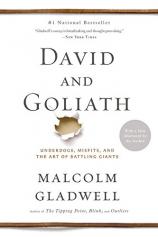David and Goliath: Underdogs, Misfits, and the Art of Battling Giants
Review
David and Goliath: Underdogs, Misfits, and the Art of Battling Giants
It is difficult to get away from Malcolm Gladwell these days. A Sunday morning interview on NPR, a cover story for Costco Connection, a podcast on jimromenesko.com (“I am everything I once despised”) and a critical look at his work in October’s Slate are just a few recent appearances.
His latest book, DAVID AND GOLIATH, is a collection of events with scientific, philosophical and cultural bents. The introduction begins with a retelling of a favorite Biblical story, David and Goliath, but he then asserts that we have been getting it all wrong for hundreds of years. David was not supposed to win because he was too small, inexperienced and vulnerable. The implication, of course, is that we continue to make wrong assumptions based on traditional criteria for success. We learn that David was prepared, ready to go with underdog armor, and we were not looking for that. Gladwell forces us to consider that the effects of deprivation, disabilities, orphanhood, poverty and great fear strengthen us and prepare us for previously unimagined victories and successes.
"Malcolm Gladwell’s reliable voice and easy manner tell uneasy stories about extraordinary successes that prove his point about actual outcomes, not expected outcomes."
Part One gives the advantages and disadvantages of having too much. Gladwell poses the questions about whether or not class sizes can be too small, and whether or not parents can have too much money for successful parenting. He details the Impressionists’ decision in Paris in the 1860s to reject the fabulously selective and important contests and exhibitions in the Salon (the Big Pond). Manet, Monet, Renoir and other painters struggled to win acceptance and be “Little Fish in the Big Pond.” Then they opted to stay away from the prized exhibition and create their own showcase. They became “Big Fish in a Little Pond” and instead displayed their own work privately. We know how that decision turned out for them.
Part Two points out the necessity (desirability, Gladwell calls it) of difficulty. He cites Martin Luther King Jr. and the marchers in Birmingham, Alabama in the 1960s as overwhelming underdogs. However, King’s advantage was paradoxical; he was from “a community that had always been the underdog.” The disadvantages of being outnumbered and out-powered for hundreds of years gave the civil rights leaders other skills. Wyatt Walker, one of King’s closest allies, was never photographed with King and therefore kept his connection private. He also managed to have the media show the Birmingham police hundreds of black marchers; the numbers looked impressive. In reality, there were only handfuls of blacks at first; the “difficulty” of being the underdog, one who is indistinguishable from another one of your color, worked to their benefit. The national coverage (even though inaccurately recorded in photographs and newspaper accounts) was a turning point in the civil rights movement. Gladwell lays out for readers the brilliance of underdog thinking.
Part Three addresses the limits of power. The most striking example is the difference in the management of grief shown by two families, who each lost a daughter to murder. One mother found the strength through her Mennonite background to forgive the murderer and save her own friendships and happiness. But the father of the other murdered child enlisted the state of California’s legal system and almost single-handedly created the Three Strikes law, which was a dramatic yet fruitless experiment. Gladwell furthers this idea by showing other scenarios where limiting authority succeeds: protection of Jews in France during World War II, elementary classroom situations, and 30 years of violence in Northern Ireland.
One of the most uplifting stories was about the Blitz of London during WWII. Traditional wisdom had the Brits fleeing the city, going crazy, and turning on one another. In reality, the survivors (Gladwell calls them the “remote misses”) became a citizenry who were more courageous than they had ever been before. Courage is what you have when you’ve been through tough times and discover they aren’t so tough after all.
Malcolm Gladwell’s reliable voice and easy manner tell uneasy stories about extraordinary successes that prove his point about actual outcomes, not expected outcomes. His perspective --- sometimes humorous, other times quietly serious --- challenges us to be more critical and observant in our own lives.
Reviewed by Jane Krebs on October 11, 2013
David and Goliath: Underdogs, Misfits, and the Art of Battling Giants
- Publication Date: April 7, 2015
- Genres: Nonfiction, Psychology
- Paperback: 352 pages
- Publisher: Back Bay Books
- ISBN-10: 0316204374
- ISBN-13: 9780316204378




